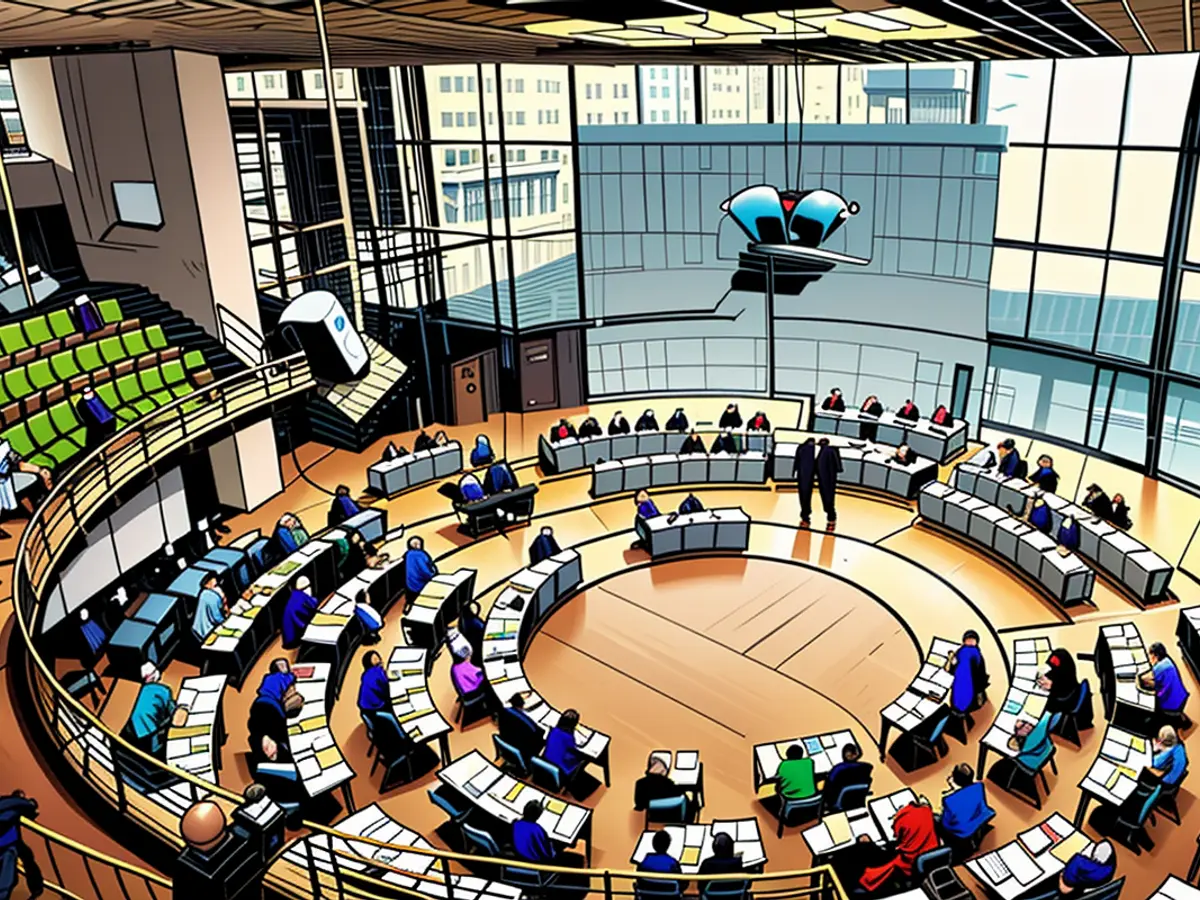Upcoming Vote for the Regional Legislative Assembly - The CDU aims to govern in Saxony and Thuringia, but the question remains: Who will be their partners?
Following impressive showings by the AfD in the state elections in Thuringia and Saxony, the CDU aims to take the lead in government in both regions. However, lengthy and complicated coalition talks are anticipated. Saxony's Minister President Michael Kretschmer (CDU) has ruled out a partnership with the second-placed AfD and is now considering a union with the SPD and the BSW led by Sahra Wagenknecht.
According to Kretschmer in Deutschlandfunk, "It won't be easy. It will take time. But it's possible." In Thuringia, CDU party chair Mario Voigt also intends to initiate conversations with the SPD and BSW initially.
Thuringia's CDU Faces a Predicament
The challenge in Thuringia: A coalition of CDU, SPD, and BSW would only command 44 seats in the state parliament, requiring 45 for a majority. A majority, though, would correspond to a coalition of CDU, BSW, and Left. The dilemma: A no-cooperation resolution precludes the CDU from engaging with the AfD or Left.
Currently, discussions are circulating that the Left, currently headed by Bodo Ramelow as head of government, may back a future minority government led by the CDU without becoming part of the administration. "We are in a new situation here," explained Voigt at a press conference with CDU federal chairman Friedrich Merz and Kretschmer.
The undisputed strongest political force in Thuringia, the AfD under controversial right-wing extremist Björn Höcke, remains disqualified: While the 52-year-old aspires to govern and extends an invitation for talks with other parties, they wish to decline the invitation, with no party willing to form a coalition with the AfD.
AfD Behaviors to Exert Influence in Thuringia
Regardless, the influence of the AfD, defined by the state office for the protection of the constitution as "securely right-wing extremist," increases, as it now holds more than a third of the seats in the state parliament and a so-called blocking minority, permitting it to obstruct vital decisions and elections requiring a two-thirds majority. For instance, the election of state constitutional judges. "We will leverage our new capacity to shape," said co-state chairman Stefan Möller regarding the subject.
The CDU now confronts the quandary of moving towards the Left party, asserted political scientist Oliver Lembcke of the German Press Agency. Such an action, however, would unavoidably reignite the debate about the firewall towards the right, the AfD, suggested the expert from the Ruhr University Bochum.
Indeed, a higher-ranking member of the state parliament advocated for the Thuringian CDU to also undertake preliminary negotiations with the AfD. "As a matter of respect for the voter, we should also engage in discussions with them," claimed the president of the Thuringian district council, Martina Schweinsburg, to dpa.
Saxony's Head of Government: Absolutely No Cooperation with AfD
Saxony's Minister President Michael Kretschmer rejected cooperation with the AfD, as he had before the state election, and also ruled out a partnership with the Left. Regarding the AfD, the CDU state chairman and top candidate said in Berlin, "The party will assume an opposition role, which is an essential component in democracy."
The election results present the CDU with an opportunity for a stable government. Nevertheless, the formation of such a government won't be painless or rapid. A coalition of CDU with Bündnis Sahra Wagenknecht and the SPD or the Greens might mathematically be feasible.
The CDU's incompatibility resolution, affecting the AfD and the Left, was deemed "absolutely correct" by Kretschmer. The AfD once again exhibited hostility and disrespect towards democracy and political adversaries during this election campaign. With radicals and far-right elements in the party's leadership, "it won't work," which became apparent even before the election.
The CDU's incompatibility resolution declares that it may not form a coalition with the AfD or the Left party nor engage in similar cooperative ventures.
Nevertheless, Kretschmer noted gradual differences in stance towards the Left party. In recent years, they have collaboratively drafted a cross-party resolution on migration last year. "We carried this together because it was evident that we have a civic responsibility," he explained. "The incompatibility resolution pertains to government participation and structural cooperation."
Mistake in Saxony State Election Results
Fascinatingly, there was an error in calculating the seat distribution in the new Saxon state parliament. As announced by the state election commission, there was a software error, causing an incorrect number of mandates to initially be reported. Corrections were required.
Consequently, the Greens and the SPD each gained an additional seat, while the CDU and the AfD each lost one seat compared to the initial release. Despite the amendments, the previous coalition of CDU, Greens, and SPD still lacks a majority in the new state parliament. However, the AfD, finishing in second place, relinquishes its so-called blocking minority in the state, based on the initially published numbers, which it narrowly failed to achieve this time.
In the ongoing coalition negotiations in Saxony, Michael Kretschmer, the CDU's Minister President, maintains his stance against forming a coalition with the AfD, similar to his position before the state election.
Despite the CDU's incompatibility resolution, some members in Thuringia, like the president of the Thuringian district council, Martina Schweinsburg, suggest engaging in discussions with the AfD as a respect to the voters' choices.








